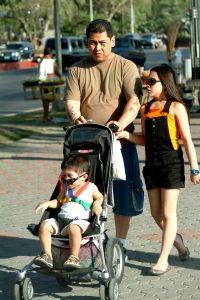Holidays and celebrations often include good fires, including birthday candles, fireworks, campfires and fireplaces. Enjoyment of these good fires, combined with a kid’s natural curiosity about fire, can set up a deadly scenario, especially when a child finds matches or lighters. Children ages 5 and under make up 63 percent of fatal fire deaths, according to the National Fire Protection Association (NFPA). Most of those deaths are caused by a child playing with found lighters and matches. The United States Fire Administration (USFA) encourages parents to start fire safety education early. Children in preschool and kindergarten are the age group that engages in dangerous fire play, and are often seriously injured or killed by the fires, according to the NFPA.
Fire Escape Plan
Create a fire escape plan for your home and have a family meeting to discuss it. Use a square piece of red construction paper to simulate blocked paths due to fire, and show kids alternate routes of getting out of the house. Discuss the importance of not hiding in closets or other locations where you or firefighters would not be able to find them. Familiarize kids with the smoke alarm sound. Talk about what to do if clothes catch on fire and demonstrate how to stop, drop and roll. Set up a practice fire drill during the day to see how kids react and how well they followed the fire escape plan.
Fire Hazard Hunt
Send kids on a fire inspection tour of the home with a pen and paper, and ask them to write down any possible hazards. The inspection should include the kitchen, living room and bedrooms. Add the garage and basement if kids spend time in those rooms. Go over the list, talking about dangers of the items they noted and how to avoid or eliminate the danger–blowing out candles before leaving a room, for example, or giving matches or lighters to an adult when they are found in or outside the home is another valuable lesson. Point out any hazards they did not notice on their own, as well as where the fire extinguishers are located.
Outdoor Fire Safety
Take a walk or drive to a local state forest or park to set the stage for a discussion about outdoor fire safety and hazards. Ask kids their favorite things about the woods, going camping or summer time. Talk about the trees and animals that live in trees. Discuss the importance of not playing with matches or fire outdoors, as the animals, trees and any nearby people and houses could get hurt. Lead by example and practice fire safety when camping or or having a fire outdoors. Advise kids to report any out-of-control fires to an adult.





